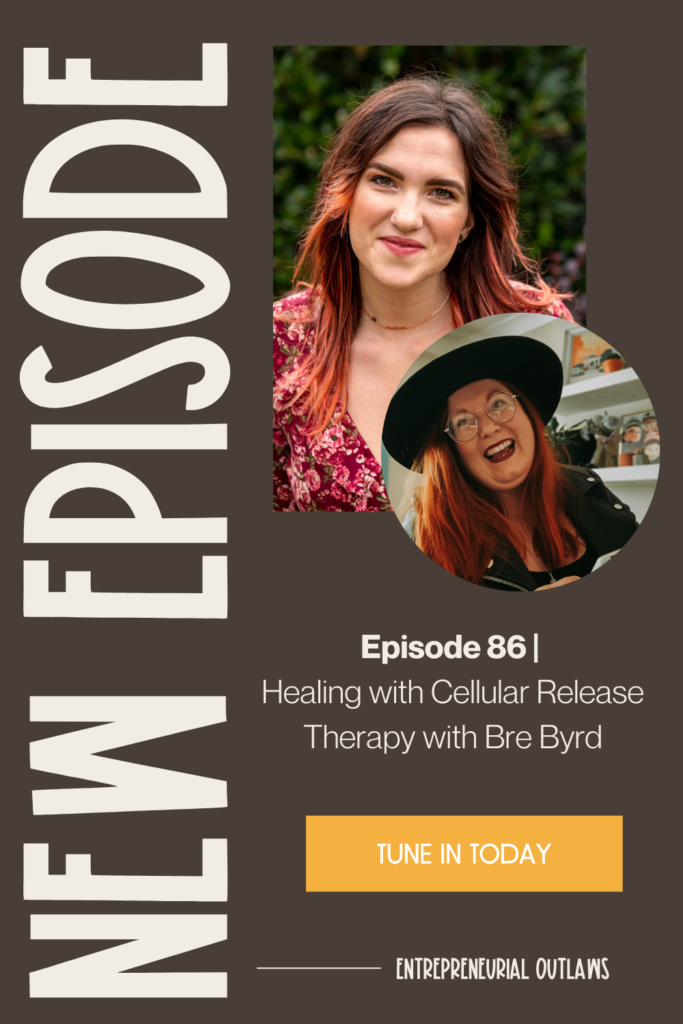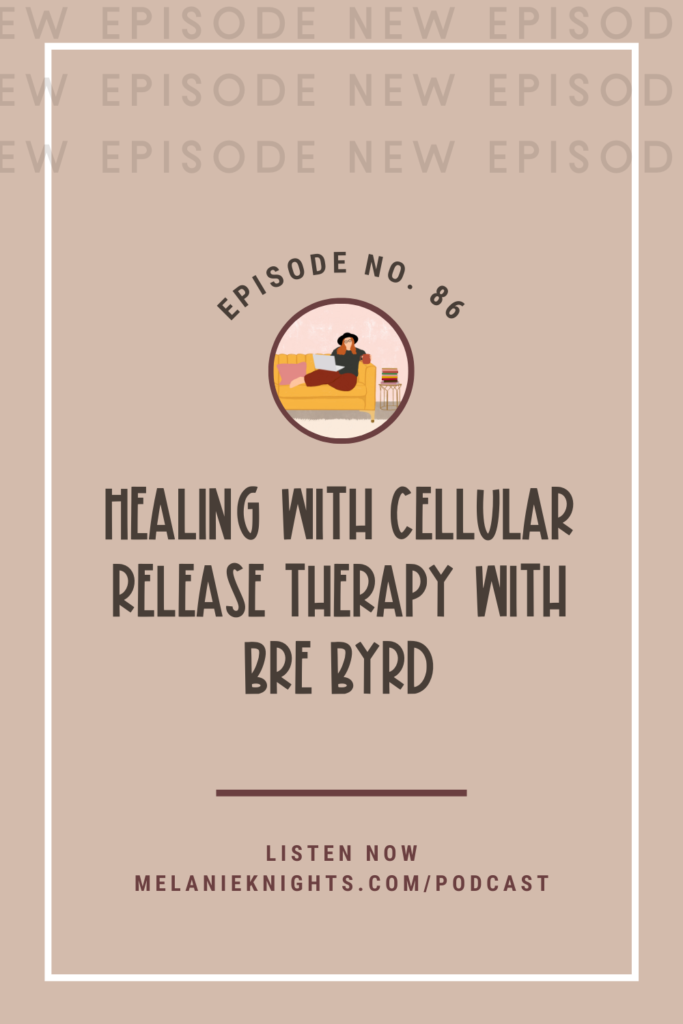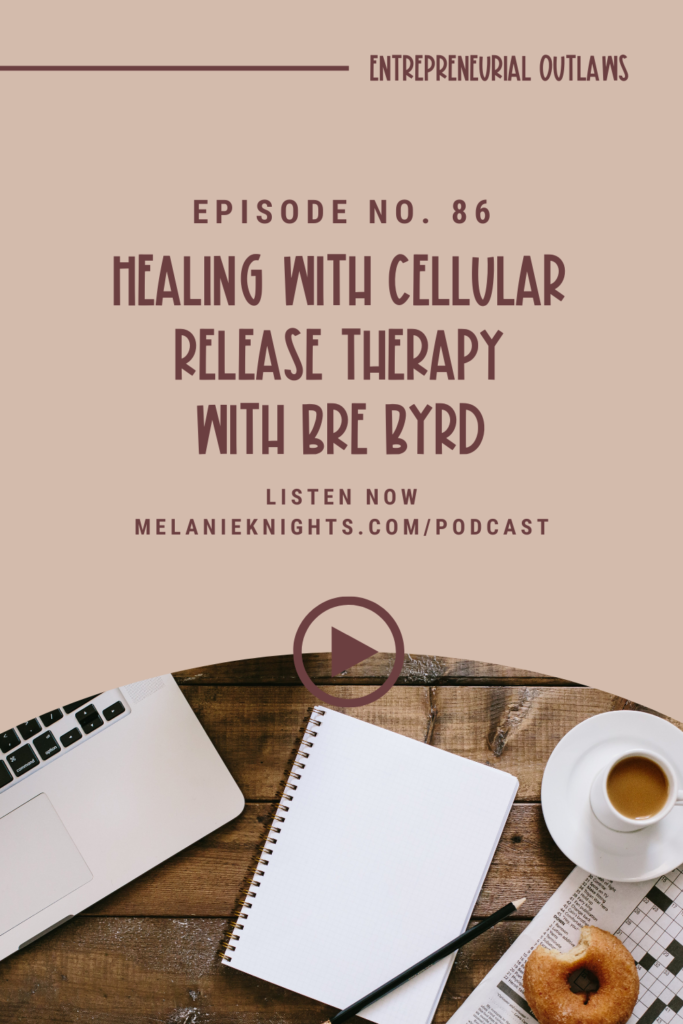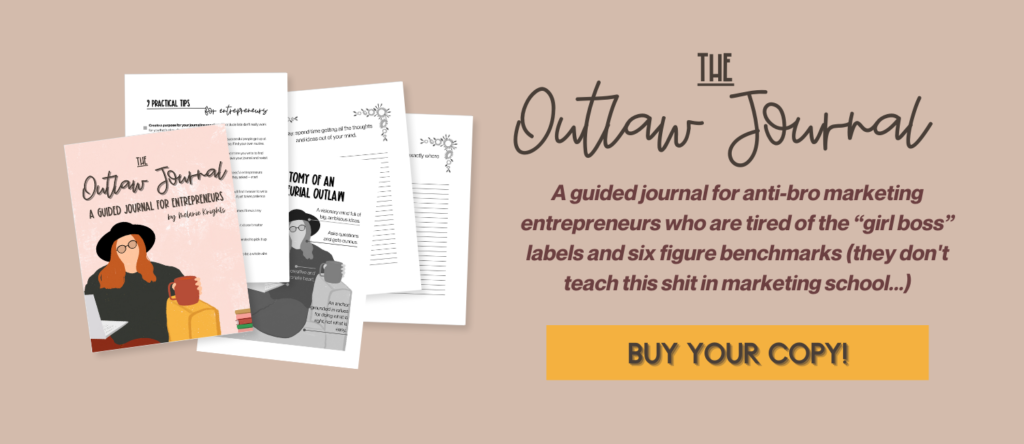
About the Episode
Another podcast veteran is joining us today on Entrepreneurial Outlaws – Bre Byrd is joining us to share how she’s leaned into Cellular Release Therapy to not only heal her own generational trauma, but create her own practice that helps womxn and queer folx heal from trauma on all levels. This conversation was such a good reminder that our health and business do not work in isolation from each other. If you’re ready to create a healthier business, this episode is a great starting place.
Topics discussed in episode #86
Topics Discussed:
- Finding moments of peace during scary times and what this looks like for Bre
- What Cellular Release Therapy is and how Bre uses it to support her clients who are entrepreneurs
- How Bre has embraced the woo-woo spiritual things without spiritually bypassing trauma and lived experience
- Recognizing the toxicity that can be present in the more spiritual niches of the online space and how to fight against it
About Bre:
Bre Byrd (she/they) is a Cellular Release Therapy facilitator and Space Holder for womxn and LGBTQIA+ folx. Her mission is to help womxn and queer folx heal from trauma, not only on an individual level but on a community level, educating families and allies along the way so that future generations can thrive.
Resources:
Connect with Melanie here:

Transcription:
Melanie Knights (00:04):
Okay. So we'll just, we'll start at the beginning. <Laugh> unfortunately, right. Okay. Okay, Brie, welcome back to entrepreneurial Outlaws. It's so wonderful to sit down with you again today.
Bre Byrd (00:17):
Thank you so much for having me. I'm so happy to be here,
Melanie Knights (00:21):
And I'm really looking forward to chatting with you because you are a returning guest and we're gonna be talking more about the work that you're doing within your business and within the community. But before we get into today's episode, I do want to ask you a little bit about how you are feeling during this season, because theme for this season of entrepreneurial Outlaws is entrepreneurial burnout, and this is the season of finishing strong marketing. We see it everywhere and life can just get so busy and we neglect. We often neglect what we need. And so I wanted to just start by asking you, what does your soul need during this season?
Bre Byrd (01:02):
Yeah, I love this question. Just, I'm gonna be completely honest and transparent if you would've asked me this even a week ago, I probably would've given you a totally different answer. As you know, I live in the us and we're recording this episode just a few days after the Supreme court, overruled Roe versus Wade, and stated that they will likely be looking at same sex relationships and same sex marriages and contraception next.
Bre Byrd (01:35):
And so I'm, I'm really looking for peace. I think that's what my soul needs the most and I'm learning what it means to let myself have that in the midst of grief and rage and, and survival and finding, you know, those little moments of peace that can get me through this terrifying and painful time while I'm also looking for ways to be active in my community, because I'm realizing now that this fight is a marathon and I'm, I'm trying to make it so that my actions are sustainable over time. So for the first time in my life, I'm really tapping out of productivity and go, go, go and trying to be here.
Melanie Knights (02:29):
Yeah. I, I can't imagine or begin to imagine what you and millions of other people are currently feeling. And I know that you and I kind of briefly connected over the weekend after that news. And I just it's, I, I feel like there aren't many words that I can even begin to explain it, but I think that obviously right now your experience and, and you stepping away from productivity, if that's, you know, that's what your soul needs that's exactly where you're meant to be. And I, I really appreciate you for sharing that with us as well, because as you said, it's, it's just a few days kind of after
Melanie Knights (03:21):
Yeah. Versus Wade was overturned. And I really appreciate you for sharing that with us because it's, there's so much happening and so much feeling right now. And I know that today we may end up talking quite a bit about this, or may kind of come back and forth through this conversation because it's entirely relevant with the work that you're doing and the conversations that are happening right now, I think in both of our communities and online, and I know that today we're gonna be, or you are going to be not, we, you are going to be introducing us to cellular release therapy. And the first time I heard you talk about this, I had to do some research because it's not something that I, or it's something I was quite unfamiliar with. And you have explained a lot about this in your newsletters and also on social media as well. But that in mind, the fact that I did not know about cellular release therapy, I was wondering if you could share with us what it is and what your experience and journey has been with it.
Bre Byrd (04:31):
Yeah, totally. So I will start with what cellular release therapy is because it isn't a very common modality, unfortunately that a lot of people are familiar with and it sounds really complex, but it's actually pretty simple. So cellular release therapy is a hypnotherapeutic system that allows a client to clear experiences, fears, beliefs, patterns from the body and energy system without having to go back into those experiences or re-experience them. So the belief which is talked about all the time in psychology and neuroscience now is that our experiences changes on a physical level. Like that's been proven. Now we know that with cellular release therapy specifically, though, it's built on the belief that your subconscious mind lives in every cell of your body and your energy system. And it's recording every moment of your life experience and making conclusions and automations based on that.
Bre Byrd (05:30):
So for that reason, when we talk about trauma in the context of C T we're talking about anything that was difficult for you at the time. So what that work actually looks like in practice is a client and facilitator have opened dialogue about whatever's coming up for the client, starting with all trauma or anything that was difficult at the time, starting with early childhood experiences. And then the client gets into a very relaxed state and the facilitator is then communicating directly with their subconscious mind, asking it to clear those experiences, beliefs patterns from the energy system in the body, your subconscious mind is doing all of that work and making all of the decisions on what can and cannot be cleared. And the facilitator is just doing exactly that they're facilitating the process,
Bre Byrd (06:19):
But your subconscious is actually doing the work and the results while of course they vary person to person, but the overarching theme is that it removes the heaviness of things. And the matter of fact it makes it more of a matter of fact. So when you think about an experience that may have been difficult for you in the past to go to reflect on, it's not going to feel like that pit in your stomach, that heaviness, like it's controlling you, it feels like, yes, that's something that happened. And I'm completely aware of why it was so difficult at the time, but it doesn't have that hold over you as much. So it's not a quick fix by any means. There's still a ton of conscious work that the client is doing outside of those sessions to create new ways of being and develop new beliefs. But CRT is kind of making the space for that work. If that makes sense.
Melanie Knights (07:13):
It does. I'm so curious because it makes absolutely sense. It ma it makes absolute sense to me. And I think I may or may not be right here, but I, I feel like it, it sounds very different to what perhaps we think of as traditional therapy in the sense, as you said, you are facilitating rather than I presume rather than kind of leading, does that make sense? Is that
Bre Byrd (07:39):
Great? Totally, totally. Yes.
Melanie Knights (07:42):
Okay. So really curious to know, in terms of, as an entrepreneur and, and as entrepreneurs listening, where, where do you see this really helping entrepreneurs specifically or impacting within our businesses because being an entrepreneur yourself, I'm, I'm just really curious to know your own experience with that. And it, if you have, you know, found this, this therapy as a journey with other entrepreneurs.
Bre Byrd (08:18):
Yeah, totally. So the way that I talk about healing is in layers healing, isn't something that you do once. It's something that we're always doing and what I've seen in my own experience. And with other entrepreneurs that I know is that starting a business brings up a whole new layer for a lot of people. And I know it definitely did for me, if you have perfectionistic tendencies, or if you have fears or beliefs about not being good enough or not being worthy, if you have beliefs around money and abundance, all of these things are going to start showing up in your business and kind of pointing you to, to what maybe needs your attention and what maybe isn't healed inside. I think your business can be the perfect mirror to reflect all of that back to you on where to start your healing. So CRT really, it clears it so that you can make more conscious choices is really how I see it. It's not, it's no longer a subconscious automation that you're just running on old programming that you learned early in life, or even in a past life. But you have a clear slate to make conscious choice of how you wanna show up in your life, how you wanna show up in your business.
Melanie Knights (09:39):
I love that. And I know I've said it here before on the show that our businesses and our health, whether it's physical, spiritual, emotional, mental health, they don't work in isolation, especially as entrepreneurs because we created a business. And so much of our time and energy is, and resources are in that, that work. You know, it's, it's something we're deeply passionate about for most of us. That's why we started and speaking for myself only <laugh> I can say how often I see these narratives and, you know, beliefs as you put up, use that word earlier that I see come up now as a business owner from childhood, from, you know, different experiences throughout my entire life and how they come up and then they affect my work or how they affect me as a business owner. And I'm really fascinated by that on an individual and personal level.
Melanie Knights (10:48):
I think it's really, really interesting and also, you know, incre incredibly hard as well to kind of work through because sometimes they, they suddenly appear out of nowhere, but I'm, it's so interesting to see how deeply connected we are to the work that we create, the work that we publish the work, you know, especially for coaches as well and mentors and how this can come back through our own businesses and our own healing as well. And many members of the community here and listeners of the show are spiritual, or at least Wooki <laugh>. I like to call it. Woo curious, cuz not everyone. I know you and I have bonded over crystals and, and such like, and I know not everybody is completely involved in that side of spirituality, but I also know that it can be really tough. I have found it very tough to know how to navigate conversations around spirituality especially to discuss and explore it in a very inclusive way. And I would love to hear your thoughts and learn more about how you've embraced the, the woo and the Spiritu side of things without spirituality, bypassing trauma and lived experiences.
Bre Byrd (12:15):
Yeah. Oh my gosh. This is so powerful and it resonates so much with me because this has been a real struggle in life and business. Just to give you some context and go back. When I started with cellular release therapy, I had absolutely no experience with spirituality at all. I was raised fundamentalist Christian. I completely left that and really had no spiritual basis or context in my life when I started C RT. So I began working with someone in April of 2020, and my life looked completely different then. So I discover C R T and start talking about, you know, energy and past lives and past life relationships and soulmates and all of these things at the same time that I'm talking about my trauma and everything is based in choice and consent. And, you know, everything was held so perfectly together in that space for me in my beginning with spirituality and it felt so magical.
Bre Byrd (13:26):
And then I entered into the more mainstream spiritual space and I was so just excited and open that it really took some time for me to start noticing some of the, the darkness that I see there now. And, and what I mean by that is just the bypassing and the toxic positivity in that space. It really took a little while for me to be like, whoa, I actually don't like that. That doesn't feel good to me. I see a lot of like manipulation and shame in, if you're struggling, you're just, you know, not spiritual enough or maybe just meditate on it and that will, you know, get you to my level of privilege really. And it's so harmful. So yeah, I could tell you where I've landed now, and this is in no way a claim that I've like, got it all figured out and this is how we should be doing it.
Bre Byrd (14:25):
I'm still very much trying to find balance here. Yeah. But the way I see spirituality is it's the context in which I view the world and choose to take care of myself while I'm having this human experience. So I meditate, I love yoga. I talk about my past lives. I work with energy. I, you know, see energy all around me. That's how I view the world. I usually have a bra full of crystals. You know, I love it. This is how I exist and I make sure. Can I cuss on here I guess, should I?
Melanie Knights (15:01):
Absolutely.
Bre Byrd (15:03):
<Laugh> okay, great. I make sure that I'm a human first and I'm here for this human experience first. So that means I'm not bypassing my own feelings or the ones of people around me. What I see a lot of in the spiritual world is that folks get all high in their own practice and then they don't want anything to bring them down. And I think the come down is just natural. That's part of being human. So rather than trying to get everyone to vibe higher with me, I just want to be secure and safe enough in my own body that I can meet them wherever they are and be able to recover and return to my practice and take care of myself, however I need to. So I hope that makes sense.
Melanie Knights (15:52):
That made absolute sense. And I think that was one of the most beautiful ways I've heard that relationship described between yourself and spirituality and your practices and rituals because you are absolute. I mean, you're absolutely right. We are humans first. And I often talk about this in terms of our businesses and marketing and all of the, the different roles that we have as a business owner. And it was interesting cuz I thought I was listening to you talk about the toxicity that happens within the spiritual spiritual world and in particular, you know, I think a lot of it is in the online space and this is certainly I think my arm chair expert opinion. It definitely seems to have been more of an issue as you know, the online space has grown in a multitude of ways because we are more aware of it.
Melanie Knights (16:47):
But I started to think about how many parallels there are between that toxicity and that, that kind of no bad days, like good vibes only that happens both in spiritual spaces. It also happens in online business as well. And this is something that I know personally, I started to notice in the last, I guess the last three years, how much of the online business space and a lot of cycles or communities were very rooted in this kind of spiritual bypassing, blaming individuals, but also as you put it, you know, go manifest on that, go, go meditate on it. And like you're going to get exactly what I've got. Yeah. And that's something that I was taught so often for ye for two years, I was, that was kind of the repetitive so-called coaching and I'm using air quotes, which no one can see, but <laugh> the coaching cuz it was my fault and this is what I was told to consistently do. And I think the work you're doing and also just how you've explained your own relationship with the spiritual world is incredibly powerful, powerful. And I think all of us listening can take something away from that in terms of our own conversations that we may have within our communities or perhaps the conversations that happen around us as business owners as well.
Bre Byrd (18:26):
Yeah. I mean, I think what it comes down to in spirituality or business or just existing in the world is if anything that I am participating in keeps me from being able to be with someone who is suffering. Like if it puts a wall between us where I can't sit with someone and look them in the eyes when they're telling me what hurts without wanting to run away or like change their mind or get them to where I am. I don't want any part of it. Like if spirituality is just manifesting and good vibes only and gas lighting people into believing that they're flawed or unworthy in some way, it just seems like rebranded religion to me. And I'm not interested in being a part of that, you know? Yeah,
Melanie Knights (19:22):
Yeah, absolutely. <Laugh> absolutely. And I think, I mean, there's a lot of conversation around this already, but I, I, I agree that it, it does feel like it is rebranded religion and that is so often what I see in the online space as well. And so being able to kind of, for me, being able to connect those dots and seeing where the spirituality can be part of the conversation, but it's understanding the bigger picture, understanding where it fits in. I think that's really, really, really important as well.
Bre Byrd (20:00):
Yes. I love that.
Melanie Knights (20:02):
So I'm so happy that I got to sit down and chat with you today about cellular release therapy and so that everybody else got to learn a little bit about work that you're doing as well. Now we are coming to the end of the episode, but as always, I have one last question for you, which is what does being an entrepreneurial outlaw look and feel like for you during this season of your business?
Bre Byrd (20:33):
Oh I don't wanna sound like I'm repeating the same thing, but it really means to me honoring my own humanity and the humanity of every single person I interact with, whether that's my clients or anyone who's seeing what I post online, but honoring their humanity over everything, over productivity, over strategy. And really yeah. Using, using my humanity and my intuition over everything. And that feels like absolute freedom.
Melanie Knights (21:13):
That was beautiful. I, I just, I heard you say humanity over productivity. And I was like, that is a quote <laugh>. That is, that is a quote in itself because absolutely. Thank you so much for, for sharing that with us and it doesn't matter if it's repetitive. Cause I think if it it's, it's honest, it's the truth. And I think right now for so many of us being an entrepreneurial outlook is deeply connected to how we're feeling about the world and how we are feeling about the relationships and connections that we wanna have with clients and, you know, friends, peers, whoever it may be in our lives. So no thank you so much for sharing that. So where can everybody connect with you online and learn more about your work with CRT?
Bre Byrd (22:06):
Yeah, so I am mostly on Instagram. I am at aunt Bree on Instagram and that's my space for everything business personal my whole life. And then I also have a website it's pride and joy code.com and that's where you can get all of the information about working with me cellular release therapy sessions. You can book there, all of the things.
Melanie Knights (22:31):
Perfect. Amazing. So everyone don't forget that you can find a full transcript along with all of the links from today's episode over in the show notes@outlawcreatives.com slash podcast. Thank you so much for being on the show Brie. I really, really appreciate it.
Bre Byrd (22:49):
Thank you so much for having me. This was a great conversation and I'm honored to be a part of it.
Melanie Knights (22:54):
Thanks. Bye
Bre Byrd (22:56):
Bye.


